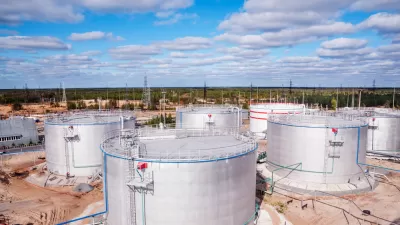With the flow of Libyan oil at a stalemate, the President ordered the release of 60 million barrels over the next 30 days to keep the world supply stable and gas prices from increasing.
The move was made in concert with the International Energy Agency (IEA), partly to assist countries like Italy that are highly dependent on Libyan oil. With the U.S. tapping into its strategic reserve, European nations will be able to draw more from Nigerian and Algerian crude, reports John M. Broder and Clifford Krauss.
While a press release from the Department of Energy emphasizes the worldwide benefits, it also recognizes the U.S. interest:
"As the United States enters the months of July and August, when demand is typically highest, prices remain significantly higher than they were prior to the start of the unrest in Libya."
Created in the 1970s during the Middle East oil crisis, the Strategic Petroleum Reserve is rarely tapped.
FULL STORY: Global Oil Reserves Tapped in Effort to Cut Cost at Pump

Planetizen Federal Action Tracker
A weekly monitor of how Trump’s orders and actions are impacting planners and planning in America.

Maui's Vacation Rental Debate Turns Ugly
Verbal attacks, misinformation campaigns and fistfights plague a high-stakes debate to convert thousands of vacation rentals into long-term housing.

San Francisco Suspends Traffic Calming Amidst Record Deaths
Citing “a challenging fiscal landscape,” the city will cease the program on the heels of 42 traffic deaths, including 24 pedestrians.

Defunct Pittsburgh Power Plant to Become Residential Tower
A decommissioned steam heat plant will be redeveloped into almost 100 affordable housing units.

Trump Prompts Restructuring of Transportation Research Board in “Unprecedented Overreach”
The TRB has eliminated more than half of its committees including those focused on climate, equity, and cities.

Amtrak Rolls Out New Orleans to Alabama “Mardi Gras” Train
The new service will operate morning and evening departures between Mobile and New Orleans.
Urban Design for Planners 1: Software Tools
This six-course series explores essential urban design concepts using open source software and equips planners with the tools they need to participate fully in the urban design process.
Planning for Universal Design
Learn the tools for implementing Universal Design in planning regulations.
Heyer Gruel & Associates PA
JM Goldson LLC
Custer County Colorado
City of Camden Redevelopment Agency
City of Astoria
Transportation Research & Education Center (TREC) at Portland State University
Jefferson Parish Government
Camden Redevelopment Agency
City of Claremont




























